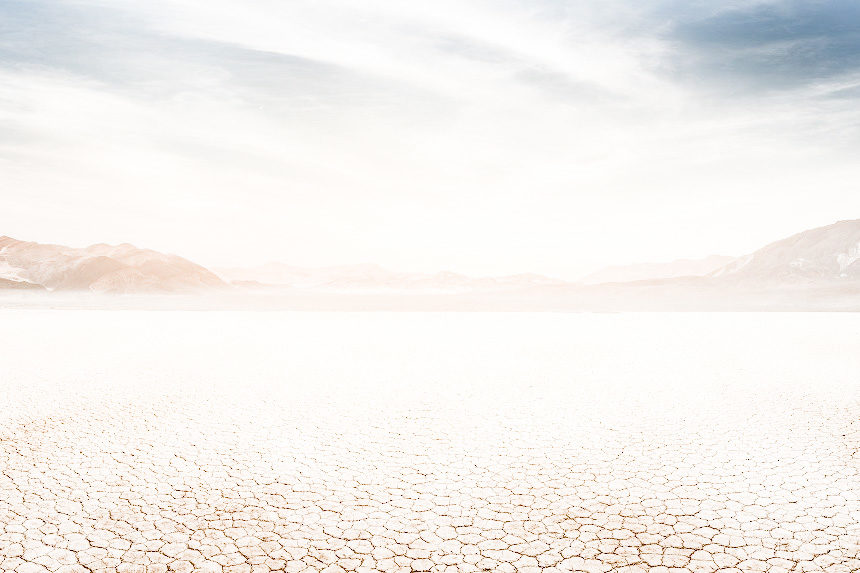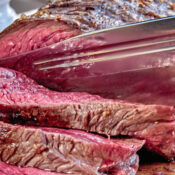The conquistadors had a name for this place: El Despoblado, the unpeopled, but Maria saw hope in those vast sands. She cinched her bag up on her shoulder. She clapped cold hands, breathed mist in the penumbral dark. “Alex,” she whispered, the border miles away. “Hold my hand.”
Alex rushed forward. Prickly chamiza leaves cut along his ankles; sharp tips scratched the skin between his socks and the too-short hem of his pant legs, but what else could he do? His sister hadn’t bought new clothes in ages.
His small brown hand in hers, Maria looked at her light skin and sighed. She pulled her brother forward.
Miles ahead of them lay Juarez; but before that, a forest and the chance for rest and water, and before that, miles of desert stretched like the enormous belly of a spotted jaguar. Its evening breath in slumber made the desert rise and fall as Maria walked, left, right, left, right. Alex still stomped his feet in protest, but soon he tired. He let Maria drag him.
Clear winter nights like this, billions of stars lit up the mammal desert. To the East, a wall of rock, not quite a mesa, looked out over the plain like the head of the yaguara . Miles away, Maria thought she saw its tail of cirrus clouds twirl imperceptibly. The children hiked for hours. The desert seemed to turn its neck to watch them pass, its eye a burst of moonlight through a cleft in the red slabs of rock.
Red rock turned black under white moon. Breathing belly of a desert, rise and fall in time with children’s steps. Alex looked up. The light between the rocks narrowed; the jaguar closed its eye.
*
North, Thomas let his feet hang off the hood of his white F150 and sighed at the sound of his wife walking up behind him. Their small house sat on cinder blocks stacked six high, for the snakes, and the scorpions. Sandra said, “Going out?” And Tom said, “Yeah.”
*
As the children made their way past the head of the animal, the moon hung bare on its black cord in the same place. Was it possible they hadn’t moved at all? Maria chewed her braid. The jaguar’s head seemed lower to the ground, resting on the pooled shadows of its paws, it’s cloudy tail curling in the West. Maria stopped. She pulled their map and compass from his backpack, but Alex knew his sister wouldn’t need them.
Alex marvelled at the whiteness of the moon and of the sand. When he looked up, for a moment, he couldn’t tell what was light and what was dark. The sky was black, but everything around him glowed and dissipated in the light, every breath they took. There was nowhere to go now except El Norte, and Maria would never forget the direction their father had taken into the forest and out of the mountains. The last time he called, he’d sent a Western Union and told them to just make it. Just make it, mis hijos, he coughed into the phone. After Mama … after —
The white, the white. Alex couldn’t think about this anymore.
*
Sandra went inside as Tom’s truck rode away. Dust rose behind it like a pillar. The TV played blue light, no: an image of an African child with a fly on the white of its eye. Sandra made a tsk sound and reached for the remote.
*
Abuelita, Abuelita, Alex cried. All around, the desert sparkled in the darkness, a glittering pane of glass. ¡Callate el hocico, pendejo! his sister said. Maria bent over the map and pretended to read it in the dark. She didn’t know why she bothered. She barely understood the lines and gradients. And she knew they were going in the right direction. She told herself she was looking at the map to give Alex a break without hurting his little-boy pride.
She gave him the last sip from their before-last bottle of water. He swallowed the pills that were said to give you the strength to resist the freezing cold during your passage through the desert. She dry swallowed the pills that were said to keep you from having a baby. Who knows what worked or not. Maria folded everything back into their pack, she tossed the plastic bottle and it rolled down the grade, making rune lines in the sand. She tucked map into the pocket where the bottle had been.
The old man who gave her the map was the most recent to give them a ride. This was how they left Oaxaca weeks ago. One old man with a car at a time.
*
Tom reached out and touched his right hand to the rifle in the passenger seat, then the knife strapped to his leg, then the pistol cinched up under his left arm, instinctively, one after another, like a sign of the cross. He turned off highway 20, into the desert proper. A garbled voice snarled on the radio. He’d make a sweeping circle across the sand, then come back to the highway roughly where he’d left it. Tom thought about the guys, “Ghost” and them. With their codenames and gear. A few weeks back, they told him, pick a call sign. Tom said he wasn’t that creative. They told him, take your time.
*
The cab of the old man’s truck had filled with the smell of his sweat. She listened for Alex waiting outside, but she heard nothing except an old man’s deep and ragged breathing.
When she climbed down from the truck, she remembered that they were stopped on the side of the road. Sometimes she left herself, wherever she was, and flew up into the white ceiling of a house, a car, or even the sky. Sometimes she imagined herself floating in space above the earth, connected by a line, a hair, to her body on the planet below. She liked facing outward into space, imagining the stars as big as suns, just far away. She liked feeling the Earth at her back.
The sun set behind the truck. Time began to move again. Maria’s shadow stretched into the darkness of the Chihuahuan desert like a bridge, she felt herself like a big cat, coiled and dangerous. The old man had fished a map out of his glovebox, called to her. “Here,” he said. “May the Virgin—”
“And with you,” Maria interrupted.
*
At some point between then and now, morning begins to spill over the landscape. An orange wound in the East of the night. At the same time, a pinprick of light begins to form in the blackness to the North. It moves, imperceptibly, toward the children. The jaguar’s head is far behind them now. The moon enormous overhead.
Alex seems to sleep while he walks. Maria knows they only have to make it to the forest, and they can rest. They can drink water and prepare to cross the river, wait out the hottest part of the day. They might make it. They could.
But in a few miles, moments after we leave them, here, anywhere they are, Maria’s body and her brother’s body will appear as distant forms, animals maybe, unpeople in the empty desert, illuminated in the headlights of a truck.
What can you do?
***
Featured image: Shutterstock
Become a Saturday Evening Post member and enjoy unlimited access. Subscribe now




Comments
strange story, like a dream, all disconnected as they usually are!